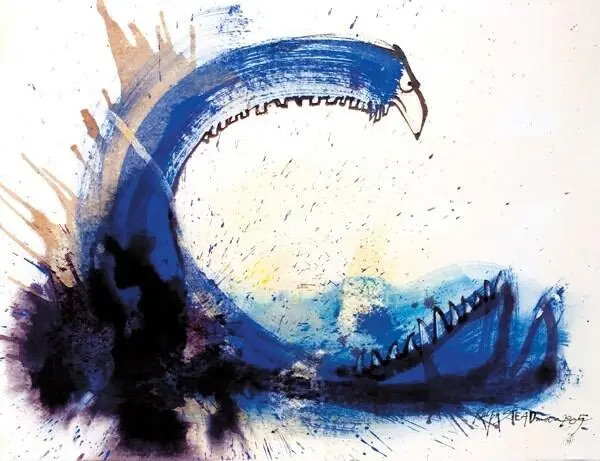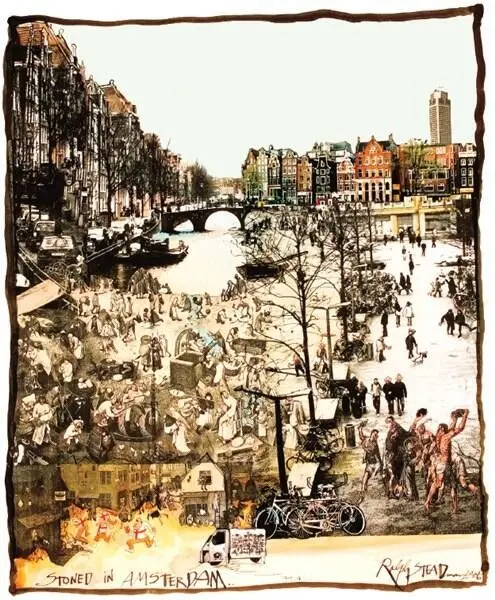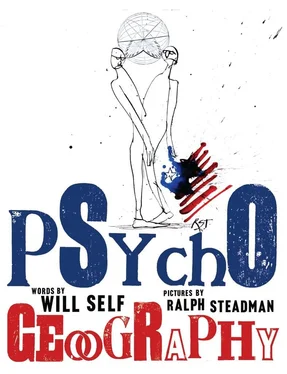
And what about Hokusai prints? As a child I was fascinated by a portfolio of these belonging to my mother: the empurpled, anfractuous waves; the black, rapier-like boats; the enormous tension implied by so much movement depicted with such a static line. In Japan, where tsunamis are frequent, they have no problem with wavy art — but then this is a culture where the meaningful coexistence of savagery and beauty is, perhaps, better understood. According to the Tao there can be little distinction between the surfers and the wave, when it comes to intentionality.
Personally, great waves have always scared the shit out of me. As a child I imagined death itself in the guise of one, rising up out of the shallow bottom of the North Sea and tilting the Thames Valley region into its own basin. As I grew, so the wavy representations washed over me: Peter Weir’s The Last Wave , in which and Aboriginal juju summons a tsunami to devastate Sydney; Katharine Bigelow’s Point Break , in which maverick surfers pull bank jobs in order to finance their quest for the ultimate, gnarly experience; and even John Martin’s The Fall of Babylon , a nineteenth-century vision of the apocalypse as a watery tumult, spumy masonry and stony whirlpools. The first time I saw this painting (which hangs in Tate Britain) I was transfixed by it, and remained gawping for hours until forcibly removed by the staff.
The word is that avid surfers have been quick to claim that, had they been in the Indian Ocean in the right place, at the right time, they wouldn’t have hesitated to try and ride the tsunami. I don’t doubt it. Surfing is synonymous with risk and adrenalin junkies are the same as any others: they always require a bigger hit. I remember it used to be the Severn tidal bore that they were always attempting to ride, but presumably this is now viewed as small beer. When I lived in Australia I felt driven to at least try and surf, but my inability to read waves correctly cost me dear and I was unceremoniously dumped. This is when the wave collapses in on itself instead of cleanly breaking, and drives the foolish surfer straight down into the seabed. I was under for long seconds, nearly concussed and was lucky to escape with a wrenched back. In Canberra an osteopath jumped on my crotch and then relieved me of $80.
All of this is by way of saying that nothing can remain off limits. We plant once more on the slopes of Vesuvius; the tourist returns to the sun recliner and the fishermen to the sea. Hokusai sends out for new horsehair brushes and a big pot of blue paint.
I once visited the Netherlands three times in one year, which, frankly, is pushing it. The third time I went I was met by a Dutchman at the airport. We were queuing to get a car park ticket when I dropped the English Sunday newspaper I’d been reading and its thirty-seven property sections flooded across the floor. One of a pair of burly fellows who were behind us in the queue muttered to his companion ‘Zwaar’, and they both dissolved into Low Church giggles. As I picked up the newsprint I asked my Dutchman: ‘What does that mean?’ And he replied, ‘Heavy’. That to me encapsulates the Dutch sense of humour: the pratfall is conceived of as ironic. It’s a form of Little Country Blues that’s oddly — if painfully — endearing.
In the Year of Three Trips, the last time I went by ferry from Margate to Zeebrugge, then drove through Belgium to Rotterdam. My girlfriend at the time discovered when we reached Margate that she’d forgotten her passport. We decided to wing it and she attempted to enter Europe using a British Library card — arguably a more impressive travel document. Belgian immigration wasn’t impressed and deported her. The official sneered, ‘If only your Mr Major would ratify the EU Treaty these problems would, I think, not be happening!’
I felt so implicated in Britishness that I misguidedly phoned ‘our’ consul. His answering machine barked, ‘Don’t bother me with trivial problems like mislaid passports!’ I left an ’umble message to the effect that we were having problems entering the country, but don’t bother doing anything if it’s a hassle — and to our surprise he called back three minutes later. ‘What the bloody hell do you mean bothering me with this!’ he screamed down the phone. ‘I’ve been up all night scraping four of your fellow countrymen off the central reservation of a Belgian motorway!’ I couldn’t help but thrill to his flagrant lack of diplomacy.

In truth, this nether-Netherlands visit was a bit of a cliché. I was writing a parody of a James Bond story and decided to set it among the dope-growing fraternity. The premise was simple: Bond falls for a lovely Dutch spy but when he arrives in Holland to investigate the skunk business with her they share a joint and it triggers all of his issues. He sees that his activities as a Lothario are simply the flipside of his misogynism. Packed off to boarding school at an early age, he has never really understood women, and, threatened by them, his priapic progress is nothing but his inability to deal with intimacy. Standing in the opulent Rotterdam hotel room, the gorgeous Dutch spy thrown naked across the silk counterpane in front of him, Bond experiences his first flop-on as his head whirls with disturbing images. I called the story ‘Rotten Smoke’, from the lines in Shakespeare’s sonnet 34: ‘To let base clouds o’ertake me in my way / Hiding my bravery in their rotten smoke. .’
In the interests of verisimilitude I’d arranged through a Dutch friend to meet up with some skunky operatives and learn about the intricacies of the business. The wacky tobacconists lived in a vertiginous old terraced house in the district of Amsterdam known — rather suitably — as De Pijp (The Pipe). Naturally they turned out to be about as glamorous as a couple of c.1976 polytechnic students reciting Monty Python’s parrot sketch. Yes, they’d got on the wrong end of their product. The house had as well: every nook and cranny stank of skunk and there were about fifty kilos stacked up in Geest banana boxes. In order not to arouse the suspicions of any Dutch narcs who happened to be passing downwind, a ventilation system had been rigged up which continually passed the air through a bucket of bleach.
The grower turned out to be a rather straitlaced young woman from Basingstoke, while the ‘taster’ was an Austrian short-story writer manqué. He wanted to talk Hemingway — most tedious. Before I left he handed me a bud the size of a baby’s fist. ‘Make sure you’ve got your head a few centimetres from the pillow before you toke on this,’ he warned me. ‘It’s that strong.’ I did as I was told but all that happened was that my girlfriend’s face was transmogrified into a hideous vegetative tangle. Rotten smoke indeed.
Ralph doesn’t need to indulge in any artificial stimulants at all, as you can see. I wonder sometimes if, like Obelix, Ralph was dropped in a vat of some hallucinogenic potion when he was a child. It would certainly explain the tortured elasticity of his vision. ‘Zwaar’, as the Dutch would say.
At Heathrow it transpired that Ivan’s passport was five days out of date. The nice man on the British Airways checkout consulted his big book and even made a call, but there was no way round it. The Italians — schizoid participants in the War on Terror — wouldn’t let him in. Looked at one way I could appreciate that Ivan constituted a security risk: he’s obsessed by guns, knives and all forms of explosion; he has hardly any impulse control yet can also display preternatural cunning; and he has a naïve faith in an omnipotent deity. Still, he is only seven. So Ivan stayed behind in London with his mother, which left four of us to carry on: the big children, little Luther, aged three, and me.
Читать дальше














